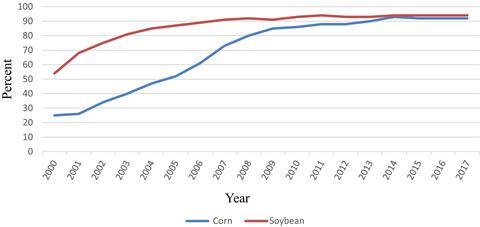当前位置:
X-MOL 学术
›
Food Energy Secur.
›
论文详情
Our official English website, www.x-mol.net, welcomes your feedback! (Note: you will need to create a separate account there.)
The cost of partners’ genetically modified organisms regulatory index on U.S. corn and soybean exports
Food and Energy Security ( IF 5 ) Pub Date : 2020-11-29 , DOI: 10.1002/fes3.265 Kwame Asiam Addey 1
Food and Energy Security ( IF 5 ) Pub Date : 2020-11-29 , DOI: 10.1002/fes3.265 Kwame Asiam Addey 1
Affiliation

|
Food insecurity continues to be a lurking global problem. To overcome this challenge, appropriate agricultural production technologies should be adopted. The introduction of genetically modified organisms (GMOs) in 1994 sparked persistent disagreements among countries. Some countries have strongly opposed it while adoption continues to grow slowly in others. The United States is one of the largest producers and exporters of GMOs. This paper examines the cost of U.S. trade partners’ GMO regulatory index (GMORI) on U.S. corn and soybean exports. Using a multilevel mixed‐effects model, a 1% increase in the GMORI leads to US$ 71.8 million and US$ 144 million loss in U.S. corn and soybean export revenue, respectively. A 1% increase in Japan's GMORI leads to US$20 million and US$ 9 million loss while that of China leads to US$ 2.4 million and US$ 74 million loss in revenue for U.S. corn and soybean export sectors, respectively. The findings suggest that even though GDP, geographical distance, exchange rate, and price ratios are important factors, the restrictions imposed by countries on GMOs have significant effects on U.S. corn and soybean exports. The study draws the conclusion that the restrictions imposed by countries on GMOs have differential cost implications on U.S. corn and soybean exports. Despite this prognosis, previous studies have shown that global adoption of GMOs continue to grow, though slowly. Hence, it is recommended that the United States continues with the information dissemination effort to enhance the adoption rate and have a consistent measure of adoption evaluation rate among trade partners.
更新日期:2020-11-29


























 京公网安备 11010802027423号
京公网安备 11010802027423号